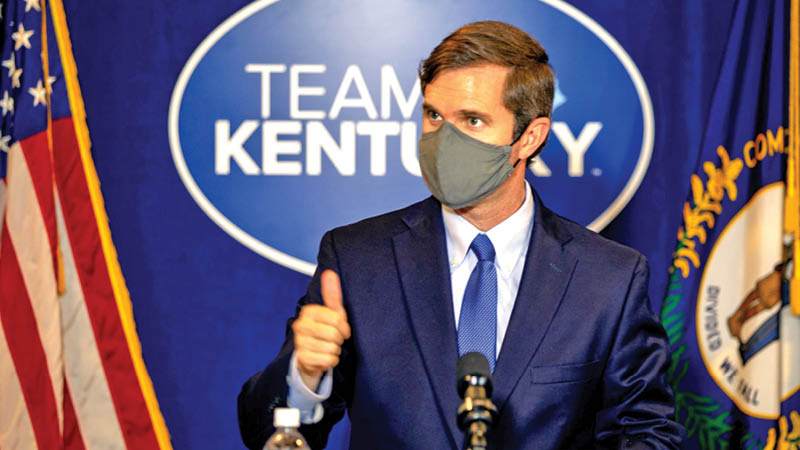Kentucky Supreme Court upholds governor’s powers to fight virus
Published 2:02 pm Thursday, November 12, 2020
FRANKFORT, Ky. (AP) — Kentucky’s Supreme Court on Thursday upheld the governor’s authority to issue coronavirus-related restrictions on businesses and individuals to try to contain the spread of COVID-19.
The ruling delivered a victory for Democratic Gov. Andy Beshear in a legal fight with the state’s Republican attorney general, Daniel Cameron, over the breadth of the governor’s emergency powers. The decision comes amid Kentucky’s worst surge of virus cases since the pandemic began.
“This is a decisive ruling and it is a win that protects all Kentuckians,” Beshear said, adding that he hopes it persuades more people to follow guidelines aimed at stemming the virus’s spread.
Responding to the decision, Cameron vowed to keep defending constitutional rights, saying there’s never been a more important time to do so “when the limits of executive power are being stretched.”
The high-stakes case tested the legality of Beshear’s orders to try to control the virus’s spread by restricting public behavior. At stake were a multitude of Beshear’s orders that include restricting the number of children in day cares and crowd sizes at public events. Also on the line was the governor’s order requiring most people to wear masks in public.
In its unanimous ruling, the Supreme Court said Beshear properly declared a state of emergency and validly invoked his emergency powers under state law to combat the health crisis.
Justice Lisabeth T. Hughes, writing for the court, said the governor’s orders are necessary to slow the spread of COVID-19 and protect the health and safety of Kentuckians.
The ongoing pandemic is “precisely the type of emergency that requires a statewide response and properly serves as a basis for the governor’s actions” under state law, she wrote.
During a September hearing before the state’s high court, Cameron’s attorney argued that Beshear had overstepped his constitutional authority. The court disagreed Thursday, ruling that Beshear acted within his statutory and constitutional authority. To rule otherwise would leave the state “without day-to-day leadership in the face of a pandemic,” Hughes wrote.
“As with all branches of government, the governor is most definitely subject to constitutional constraints even when acting to address a declared emergency,” Hughes added. “In this case, however, the challenged orders and regulations have not been established to be arbitrary.”
Beshear said the ruling sent a clear message that his actions are “legal and constitutional and fundamental” to deal with a health crisis requiring a “comprehensive, statewide approach.”
The case originated in northern Kentucky, where a child-care center, an auto race track and a bakery challenged the governor’s COVID-19 orders, saying the actions threatened their businesses. Cameron intervened in support of the businesses’ efforts to strike down the emergency orders. In July, the Supreme Court stepped into the dispute by halting any lower court orders blocking Beshear’s actions pending its own review.
In writing for the high court Thursday, Hughes said: “Even if some plaintiffs arguably have established irreparable harm to their businesses, that alone is insufficient to justify an injunction precluding enforcement of emergency orders and regulations directed to the protection of the health and safety of all Kentuckians.”
The Supreme Court also said the governor has authority to “act without deference to any determination” by local authorities or emergency management agencies.
Once the pandemic ends, the historic case could have long-term effects on the reach of a Kentucky governor’s authority in times of crisis. Beshear’s attorney said a ruling against the governor would restrict his and his successors’ ability to respond to emergencies such as floods and ice storms.
But the issue could resurface next year when the Republican-led legislature meets.
Some GOP lawmakers have signaled a willingness to consider revising state law to curb the governor’s emergency powers. Republican House Speaker David Osborne said the Supreme Court ruling appears to provide “further evidence of the great need to better define emergency powers granted by previous legislatures.”
Beshear on Thursday urged lawmakers to leave those powers intact, noting that governors nationwide imposed similar orders to combat the virus.
“This concept that we’re going to fight in the legislative session over this, let’s just get through COVID,” he said in a virtual briefing. “And then anybody can look at it. We’ll have a conversation on it. The last thing I want to do is to keep an emergency for COVID in place when it is not needed. I want to get out of this thing as much as anybody else.”
Despite the court’s ruling, lingering issues remain about executive power that should be considered by lawmakers. Cameron said. He expressed his willingness to work with them on the issue.
“We have always maintained that the governor should be able to enact policies that protect the health of citizens, but he must follow a process that allows for public input and respects the Constitution,” Cameron said in a statement.






